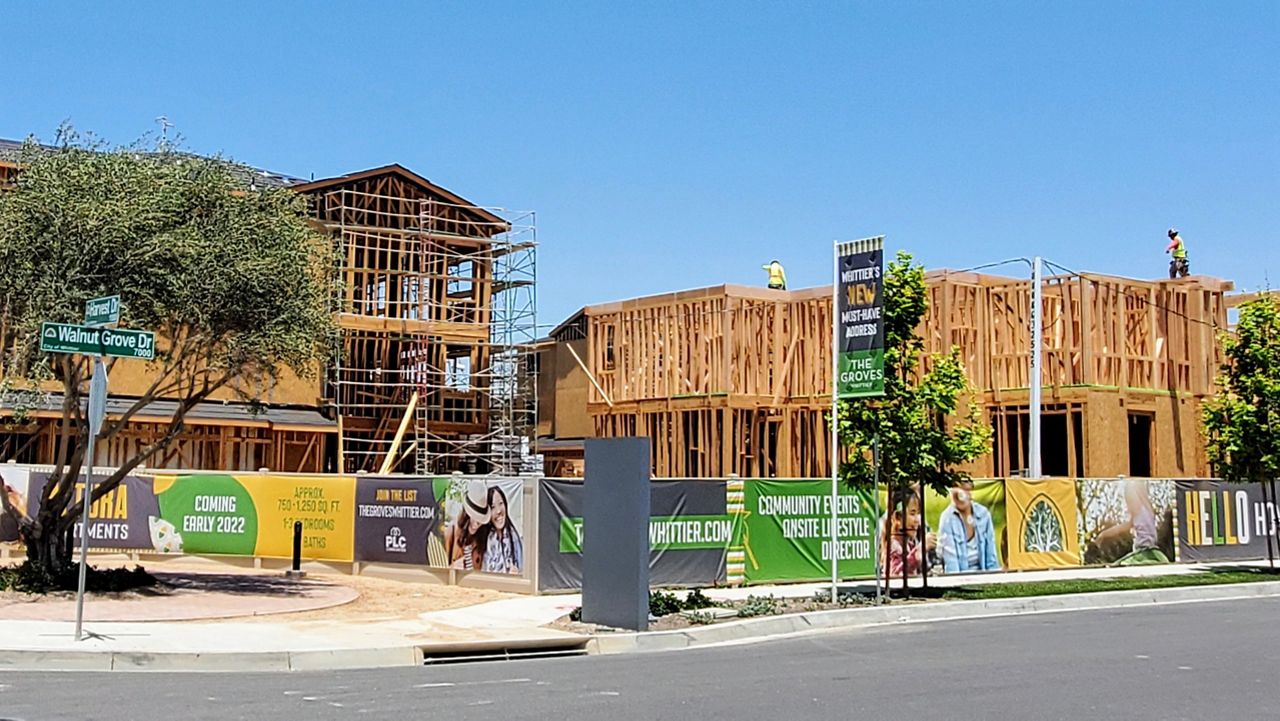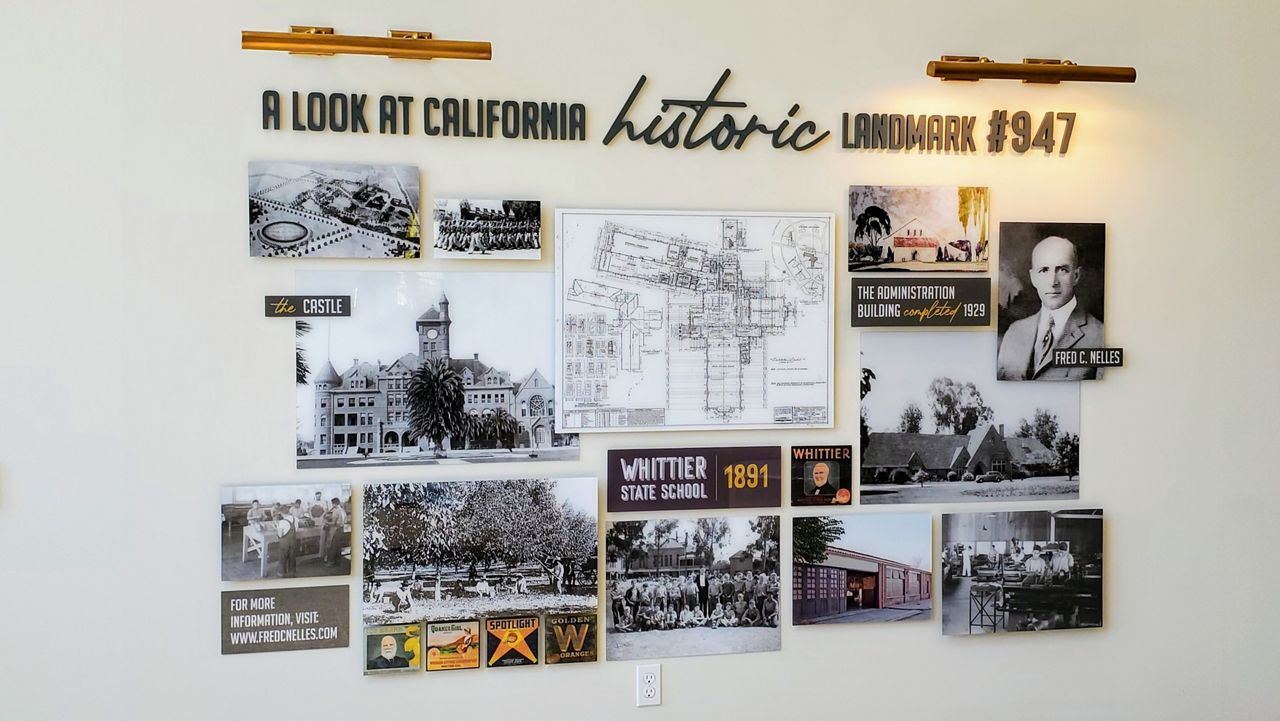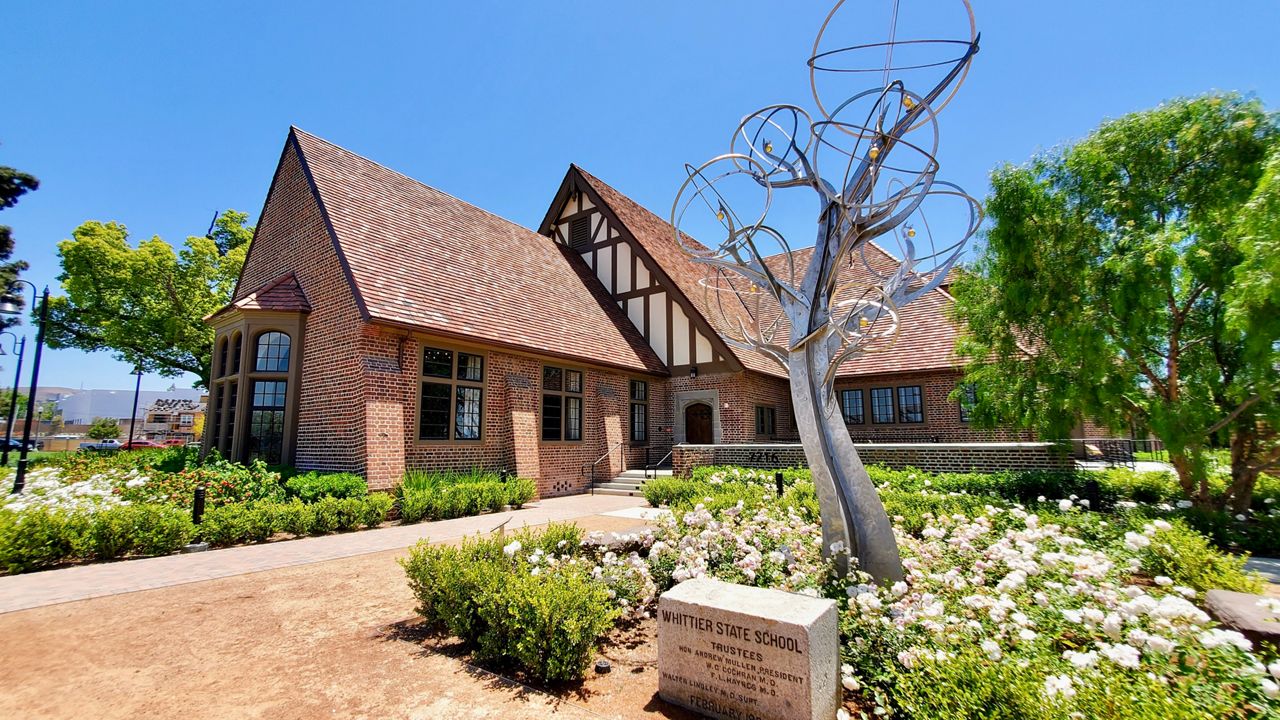WHITTIER, Calif. — Nearly every day since moving in at The Groves Whittier, Tracy Wittman walks along a red brick road to learn about the history of the 130-year-old site.
Wittman, a Whittier Historical Society board member, enjoys stopping at the historical markers that dot parts of the three-quarters of a mile trail and reading about the legacy of the old brick buildings.
One such marker described the Romanesque architecture of one of the administrative buildings and showed an aerial view of the 75-acre former state and later juvenile detention centers.
If you look closely, bricks on some of the more than 100-year-old buildings still have black scribblings on them.
"Every day, I walk the Heritage Trail," Wittman said. "I love reading about anything about the Fred C. Nelles era and earlier. It's so admirable Fred C. Nelles was a very dedicated man and what he did for the boys and girls here was amazing. I just have the utmost respect for him and all of the superintendents of the school."
While the property began as a state reform school, the former Fred C. Nelles Youth Correctional Facility is now a growing mixed-use residential and retail development known as The Groves Whittier.
Brookfield Residential has transformed the site, which closed in 2004, into a thriving residential and retail place in Los Angeles. The site's history is ingrained in the fabric of the new master-planned community.

On a recent day, visitors could see construction workers working on top of skeletal wood buildings. A family enjoyed a visit to the pool, and a couple walked around the neatly manicured lawns and blocks.
"We've already sold more than half of the homes that we are building here," said Alison Girard, Brookfield Residential's director of marketing, as she gave Spectrum News a tour of the site. "There's a lot of demand."
Much has changed at the site since Brookfield acquired it from the state for $42.5 million in 2011.
For nearly two decades, the site was vacant and rundown. Weeds and green, overgrown grass dotted the area. The windows of several of the 100-year-old historical buildings were either broken or boarded up.
The state closed the infamous juvenile detention center — where country singer Merle Haggard was once a resident — after 113 years of operation in 2004. The state initially sold the property, the city's largest undeveloped property, to another developer. When that didn't come to fruition, former California Gov. Arnold Schwarzenegger had suggested plans to convert it into a prison hospital or rehab center.
The community protested the state's plans, and the state ultimately decided to sell the property to Brookfield.
Once the city approved Brookfield's plans in 2015, and after clearing hurdles about the future of some of the historical buildings with the local historical society, Brookfield finally broke ground in 2018. Once completed, the site will feature 561 homes, 189 apartments, two retail centers, a brewery, food hall, coffee shop, dog park, putting green, swimming pools, children's playground and more.
Girard said four buildings that have stood for more than 100 years are being preserved and repurposed. One of the buildings — the former chapel — is now called the Commons. The community center building features a lounge, gym, meeting rooms with corkboard walls and co-working space.

Just outside of the building is an art structure of a steel Mockingbird Tree, designed to give homage to the site's agricultural roots.
"It's important to support that history," Girard said, adding that there is a page on the Whittier Historical Society website about the history of the site and preserved buildings. "Brookfield worked long and hard with the city and other stakeholders to come together with what the final development was going to be."
Brookfield expects to complete the development in 2022. Home prices range from the low $600,000s to more than $1 million.
The prices of the for-sale homes started lower at opening a year ago, Girard explained, but the recent skyrocketing price of lumber, high construction costs, demand for housing and other market forces led to the price increase. The monthly Homeowners Association fee ranges from $203 to $368.
Wittman noted that she wanted to be among the first to own at the Groves.
"The appeal of living in that historic site was important for me and the fact that I'm helping document the history of the place," she said, adding that the Whittier Museum has a free multi-part exhibit of the former Whittier State School and juvenile detention center.
Wittman explained how it's unfortunate that Brookfield couldn't preserve some of the other "architecturally very interesting" buildings. Still, she said Brookfield did an amazing job of rehabbing and preserving the four or so buildings that remain in place.
When asked how she likes living at a place knowing that this was a former reform school and juvenile detention center, Wittman said it felt a bit uneasy, but "it's becoming normal for me."
Wittman has heard some of her neighbors joke about ghost hunting and "some claiming that they can feel the souls of the boys that once lived here." The site has been a popular place to film movies and TV shows and ghost hunting.
"I don't subscribe to that," she said.
Wittman added that she's glad that Brookfield has tied the history of the place to the new development.
"This place was really important to the city of Whittier," she said. "Whittier was struggling at that time. The school provided a lot of jobs for people and gave the city a statewide and countrywide profile since many knew about the school. Also, the idea that this place helped a lot of boys and girls become productive members of the community, makes it important to remember it."



